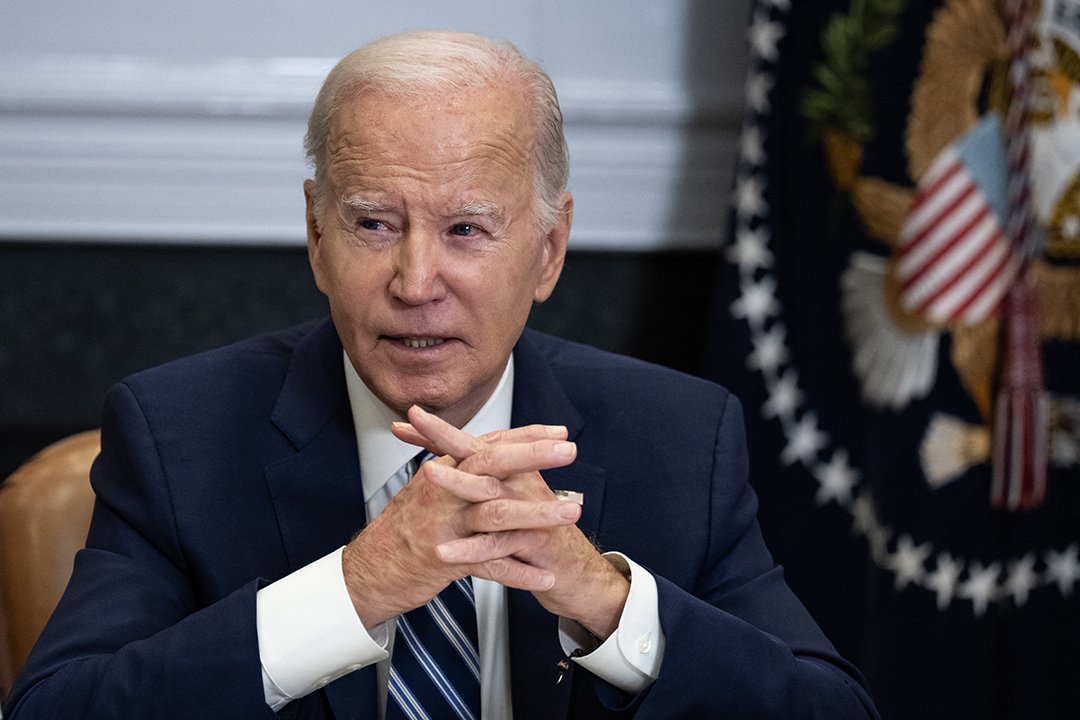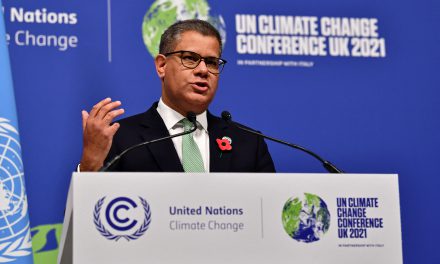The United States remains the most powerful country in the world in terms of “hard power”—economic and military might. Its Gross Domestic Product (GDP) (the final value of goods and services produced within one year) was US$20.93 trillion in 2022, measured in constant 2015 USD. By contrast, the world’s second-largest economy, China, boasted a 2022 GDP of US$16.33 trillion. This difference of US$4.6 trillion is an extraordinary amount of money; just the difference is 12.75 times the size of South Africa’s entire economy. To put it simply, China’s economy is 45 times bigger than South Africa’s, while the US economy is 58 times larger.

US President Joe Biden. Photo by Drew Angerer/Getty Images via AFP)
It’s not clear how much China’s figures can be trusted, and some serious research suggests that it has inflated its growth figures. When the Chinese Communist Party (CCP) controls the data and is willing to rewrite history, one should be sceptical. China is in for a hard landing because of this authoritarian institutional design in which the free markets of ideas, goods, and services cannot flourish. Also, while GDP has climbed remarkably, no matter what you believe about the validity of the data, China’s population is ageing and its GDP per capita remains thin at US$11,560 in 2022. As The Economist predicted, China is clearly growing old before it grows truly rich. US GDP per capita is nearly six times higher than China’s at US$62,789 for 2022. Moreover, China’s subtle support for Russia has accelerated disinvestment from China, exacerbated, of course, by other factors, largely to do with poor governance.
Moreover, as a recent article in Foreign Affairs put it, “this view [that the world has become multipolar] is wrong. The world is neither bipolar nor multipolar, and it is not about to become either. Yes, the United States has become less dominant over the past 20 years, but it remains at the top of the global power hierarchy—safely above China and far, far above every other country.” This is not an overstatement, despite the adjectives. While military expenditure is hardly a reliable expression of the efficacy of a nation’s power, it is still a useful marker, and the US spent US$877 billion on its military (in current USD) in 2022, while China’s equivalent was $292 billion in the same year. As a percentage of GDP, that’s 3.45% for the US and 1.6% for China.
While the US will remain dominant in ‘hard power’ terms for some time to come, its ‘soft power’ is sadly diminishing. In geopolitics, the US has been the guarantor of a rules-based international order since the fall of the Berlin Wall in 1989. Any use of hard power, though, can diminish the levels of trust in that order and leave important but fragile coalitions alienated and increasingly hostile towards the US. In other words, hard power expenditure often comes at the expense of delicate social capital.
The key thing, then, is to understand how the US is likely to continue to wield its power, as this disproportionately affects the rest of us. Arguing that the US is powerful is not the same as arguing that it is popular. It has made numerous foreign policy blunders in the last two decades, including its failed interventions in Iraq, Afghanistan, and Libya. Its sanctions regime against Russia has created opportunities for anti-western sentiment to gain traction across the ‘Global South’. The fact that many countries are ignoring those sanctions allows Russia to fund its war efforts against Ukraine, while support for Ukraine becomes increasingly tenuous. US support for Israel also appears to be leaving the US increasingly isolated in the international community.
It is critical to understand these dynamics and predict how the US is likely to behave over the next five years, primarily in terms of internal domestic US politics. One major concern, of course, is the (re)rise of Trump. For anyone who has read anything about the history of the Republican Party and how Abraham Lincoln and his team effectively defeated slavery extension (though it came at the awful cost of the Civil War), it is hard to believe that the same party could bring itself to elect Trump. The Biden administration, in turn, is losing domestic support, and the bipartisan divide appears to be growing ever stronger.
To be technical for a second, the importance of domestic politics in shaping foreign policy is best explained by Robert Putnam’s paper Diplomacy and Domestic Politics: The Logic of Two-Level Games, published in the journal International Organisation in 1988. He writes: “The politics of many international negotiations can usefully be conceived as a two-level game. At the national level, domestic groups pursue their interests by pressuring the government to adopt favourable policies, and politicians seek power by constructing coalitions among those groups. At the international level, national governments seek to maximise their own ability to satisfy domestic pressures, while minimising the adverse consequences of foreign developments. Neither of the two games can be ignored by central decision-makers, so long as their countries remain interdependent yet sovereign.”
Now it is clear that, because of the vastly different political configurations of the US and China, US foreign policy and its position at various international multilateral forums is far more influenced by domestic politics than China’s. Xi Jinping simply does not care as much about his domestic constituents—either citizens or other CCP party members—as Joe Biden (or any US president, for that matter) does. Xi has eradicated power-sharing mechanisms within the CCP, but Biden remains as beholden to his domestic constituents as ever before. It might seem that China would therefore be able to get its way more often at the international negotiating table. But Putnam’s findings are deeply counter-intuitive and insightful. The party that enters the negotiating space with a larger win-set (fewer domestic constraints) paradoxically ends up compromising more, while the party with the smaller win-set earns more for its country because its domestic constraints compel it to compromise less. This is especially the case when the country is already internationally powerful. Putnam’s analysis travels beyond being able to explain the US position at various climate COPs, for instance, to providing insight—I argue—into how the US thinks at any given time about significant geopolitical events and its foreign policy responses to those events, at least three of which are currently reshaping our world as we know it:
First, domestic support within the US for supporting Ukraine against Russia is narrowing and shrinking. An August 2023 article by William A Galston of the Brookings Institute, a top US think tank, indicates that the partisan divide is strong: in a CNN study, 62% of Democrats back additional funding, while only 44% of independents and 28% of Republicans do. Younger voters are less supportive, though college graduates express higher levels of support within that cohort of voters. In a Pew Research Centre study, Republican support was shown to have decreased sharply, with 44% of Republican respondents expressing a belief that the US was doing too much for Ukraine (up from just 17% in the summer of 2022). While Biden and the Democrats look set for a slim victory at the US polls in 2024, a Trump return to the White House would likely halt aid to Ukraine, and he might well execute his threat to leave NATO. This would leave Europe more susceptible to a volatile conflict with no obvious end in sight. This would ultimately be terrible for the US, but a protracted war presents serious risks for any US president, as indicated above. The relative failure of sanctions against Russia appears to have rendered Russia capable of funding an endless war, while difficulties in the Middle East also sap US hard power and deepen anti-western sentiment that it will find hard to reverse.
Second, while Biden has taken numerous strong stands against China, a Trump presidency would likely see a return to a narrow focus on protective tariffs against Chinese imports or even a major impetus towards decoupling from China altogether (though he would find these tough given the global realities of interconnectedness in goods, services, and finance). On the other hand, Trump would likely rescind US support for Taiwan, which would strengthen Xi’s hand in the region considerably and may even precipitate a full-scale Chinese invasion of Taiwan. Biden would retain support for Taiwan and navigate the fragile economic situation perhaps more delicately. Nonetheless, Biden is aware that if his policies are perceived to create economic fragility at home, the Trump appeal will grow. Trump has been adept at exploiting grievances created in the wake of globalisation. A more economically interdependent world has delivered diffuse gains but also allowed the already wealthy to accrue a growing portion of the global pie.
Diffuse global gains do not compensate for acute US job losses at home, hence the appeal of populist promises to make America great again. Socio-political upheaval in the wake of globalisation and technological advances that displace labour have combined to exacerbate partisan divides in the US. Increasingly, then, US presidents are aware that foreign policy missteps will have serious repercussions for how they are viewed by their domestic constituencies. African countries need to better understand these dynamics as they consider their foreign policies into the future, as they appear to be swayed by anti-western/US rhetoric. The danger of this rhetoric is that it taps into deep and historic roots of understandable resentment, but this does not mean that it is sensible foreign policy to be blindly anti-western in diplomatic practice.
Third, domestic constituencies in the US have highly divided views on the Israel-Hamas war. Across different ages, political persuasions, and education levels, opinions are strong. The US has traditionally supported Israel in a volatile region, but continuing to do so is becoming increasingly challenging. Biden initially refused to call for a ceasefire in Gaza in the wake of the horrific Hamas 7 October 2023 attack on Israel. Two months later, however, he sent Antony Blinken, US Secretary of State, to Israel to try and de-escalate the rising conflict and prevent regional contagion. Strategically, the emphasis appears to be on keeping hopes alive of the ultimate creation of a Palestinian state. Again, Republican and Democrat voters are highly divided on the matter, but a bipartisan view appears to be developing among younger voters that Israel’s response is disproportionate and counterproductive. Some experts opine that US public opinion on the Israel-Palestine question will have little bearing on the war’s trajectory, but, as argued above, what the US does matters for everyone.
As a Chatham House article by Bilal Y Saab argued in November 2023, “the last thing President Biden wants during re-election season is a war between Israel and Hezbollah that could drag the US into the conflict and lead to a direct confrontation with Iran.” The Israeli cabinet appears to fear that a war with Hezbollah on its border with Lebanon is inevitable, despite Hezbollah’s statement that it does not want regional escalation. Saab argues, though, that if Israel succeeds at destroying Hamas, outright war with Hezbollah is almost inevitable, and the conflict would dwarf that of the 34-day clash of 2006 between Israel and Hezbollah. Saab ultimately calls on the US to do everything in its power to prevent another devastating war, though it’s not clear that Iran has as much power over Hezbollah as is often thought. Of course, one major difficulty here is that very few citizens across the world fully grasp the complexity of the situation, and US action, which may appear rational to some constituents, will appear inflammatory to others.
These three geopolitical upheavals alone mean that African countries need to carefully consider their future global alliances, and citizens need to be able to put pressure on their governments to adopt foreign policy positions that are best for long-term growth and stability.
The Economist Intelligence Unit forecasts that the Israel-Hamas war, the Russia-Ukraine war, and increased US-China rivalry, will “lead to more fragmentation and regionalisation in the world economy, dragging on growth potential.” Moreover, it rightly points to the importance of the 2024 US election, which will “highlight political and cultural division there, and could prompt another sweeping set of policy changes if Republicans were to win the presidency” (though this is not their baseline forecast).
African countries are increasingly at risk of succumbing to the idea of the US’s demise and the growth of a more multipolar international order. Strong analysis suggests we should guard against that kind of thinking. China, India, Russia, and Brazil (the original BRIC members) have their challenges, and courting countries like Iran to join the group risks further alienating the US, especially given the fragile situation in the Middle East. I am not suggesting that African governments unthinkingly side with the US in everything, but rather that they choose their enemies carefully (and their friends). Building close ties with reliable future partners which have strong and sustainable economies will be key. Demanding better terms of trade, along with climate change loss and damage funding, must be a key part of this international engagement toolkit. But maintaining ties that serve countries’ long-term economic and political interests will also allow them to gently persuade the US not to lose its historic soft power appeal as it increasingly feels compelled to expend its hard power.
Strategically, the important foreign policy and trade message is this: Understand the size and type of “win-set” that any given country has that shapes its foreign policy. Countries with large win-sets that pay little attention to their domestic constituencies may be easier to work with in the short run (the transaction costs are lower), but their sustainability will necessarily be in question. The key is to persuade stronger countries like the US, with smaller win-sets, to pursue foreign policy initiatives that create mutual benefit in the world and avoid mistakes like Afghanistan, Iraq, and Libya.
- This article first appeared in Business Day.
- To listen to the related podcast of the Radio 702 interview between Bongani Bingwa and Dr Ross Harvey, click here.
Dr Ross Harvey is a natural resource economist and policy analyst, and he has been dealing with governance issues in various forms across this sector since 2007. He has a PhD in economics from the University of Cape Town, and his thesis research focused on the political economy of oil and institutional development in Angola and Nigeria. While completing his PhD, Ross worked as a senior researcher on extractive industries and wildlife governance at the South African Institute of International Affairs (SAIIA), and in May 2019 became an independent conservation consultant. Ross’s task at GGA is to establish a non-renewable natural resources project (extractive industries) to ensure that the industry becomes genuinely sustainable and contributes to Africa achieving the Sustainable Development Goals (SDGs). Ross was appointed Director of Research and Programmes at GGA in May 2020.












